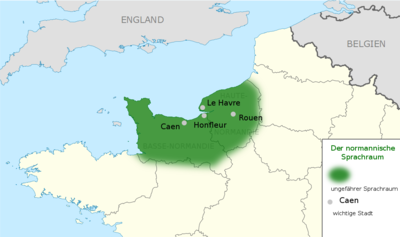Norman language: Difference between revisions
George Swan (talk | contribs) (add image) |
No edit summary |
||
| Line 1: | Line 1: | ||
[[File:Norman language map.png | thumb | 400px | Norman language spoken here.]] | [[File:Norman language map.png | thumb | 400px | Norman language spoken here.]] | ||
The '''Norman language''', sometimes called '''Norman French''', is a [[Romance language]], that was influenced by [[Norse]] and [[Breton]]. | The '''Norman language''', sometimes called '''Norman French''', is a [[Romance language]], that was influenced by [[Norse]] and [[Breton]]. | ||
It is one of the [[langues d'oïl]], like the [[French language]] and the [[Walloon language]]. [[Jèrriais]], [[Guernesiais]], [[Sercquiais]], and [[Auregnais]], from the islands of [[Jersey]], [[Guernsey]], [[Sark]] and [[Alderney]] diverged from the Norman language after the English kings lost their Norman territories on the French mainland, in the 13th century.<ref name=JèrriaisJerseysTraditionalLanguage/> | It is one of the [[langues d'oïl]], like the [[French language]] and the [[Walloon language]]. [[Jèrriais]], [[Guernesiais]], [[Sercquiais]], and [[Auregnais]], from the islands of [[Jersey]], [[Guernsey]], [[Sark]] and [[Alderney]] diverged from the Norman language after the English kings lost their Norman territories on the French mainland, in the 13th century.<ref name=JèrriaisJerseysTraditionalLanguage/> After Duke William of Normandy conquered England in 1066, this language became the language of the aristocracy and many official documents for centuries. Even today, on occasions when Royal Assent is given to Acts of Parliament in the House of Lords, the Clerk announces it, in most cases, in the words "La reine le veult." | ||
==References== | ==References== | ||
Revision as of 04:53, 19 August 2022
The Norman language, sometimes called Norman French, is a Romance language, that was influenced by Norse and Breton. It is one of the langues d'oïl, like the French language and the Walloon language. Jèrriais, Guernesiais, Sercquiais, and Auregnais, from the islands of Jersey, Guernsey, Sark and Alderney diverged from the Norman language after the English kings lost their Norman territories on the French mainland, in the 13th century.[1] After Duke William of Normandy conquered England in 1066, this language became the language of the aristocracy and many official documents for centuries. Even today, on occasions when Royal Assent is given to Acts of Parliament in the House of Lords, the Clerk announces it, in most cases, in the words "La reine le veult."
References
- ↑ Jèrriais: Jersey's traditional language. Retrieved on 2022-08-18.
